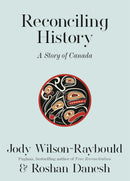Description
The Honourable Jody Wilson-Raybould, PC, QC, MP, is the former Independent member of Parliament for Vancouver Granville. She served as the minister of justice and attorney general of Canada, the minister of veterans affairs and the associate minister of national defence until her resignation in 2019. Wilson-Raybould is a lawyer, an advocate and a leader in British Columbia’s First Nations. She has been a provincial Crown prosecutor, a councillor for the We Wai Kai Nation and a chair of the First Nations Finance Authority. She has also served as Regional Chief of the BC Assembly of First Nations.
Jody Wilson-Raybould is a descendant of the Musgamagw Tsawataineuk and Laich-Kwil-Tach peoples, who are part of the Kwakwaka’wakw and also known as the Kwak’wala-speaking peoples. She is a member of the We Wai Kai Nation. Her traditional name, Puglaas, means “woman born to noble people.”
From the #1 national bestselling author of ’Indian’ in the Cabinet and True Reconciliation, a polyphonic history of our land—powerful, devastating, remarkable—as told through the voices of both Indigenous and non-Indigenous peoples.
The totem pole forms the foundation for this unique and important oral history of Canada. Its goal is both toweringly ambitious and beautifully direct: To tell the story of this country in a way that prompts readers to look from different angles, to see its dimensions, its curves, and its cuts. To see that history has an arc, just as the totem pole rises, but to realize that it is in the details along the way that important meanings are to be found. To recognize, just as Indigenous carvers do, that the story of the past is always there to be retold and recast, and must be conveyed to generations to come. That in the act of re-telling, meaning is found, and strength is built.
When it comes to telling the history of Canada, and in particular the history of the relationship between Indigenous and non-Indigenous peoples, we need to accept that the way in which our history has traditionally been told has not been a common or shared enterprise. In many ways, it has been a highly exclusive and even aggressively siloed one. Among the countless peoples and groups that make up this vast country, some have dominated and controlled how the nation’s stories are told—often emphasizing the voices and experiences of a certain few over those of many others.
History-telling today is breaking away from this exclusivity. Our Story in Our Words shares voices that have traditionally been marginalized, and in this groundbreaking book they are telling and re-telling history from their perspectives. Born out of the oral history in True Reconciliation, and complemented throughout with stunning photography and art from the different periods of history, Our Story in Our Words takes this approach to telling our collective story to an entirely different level.


